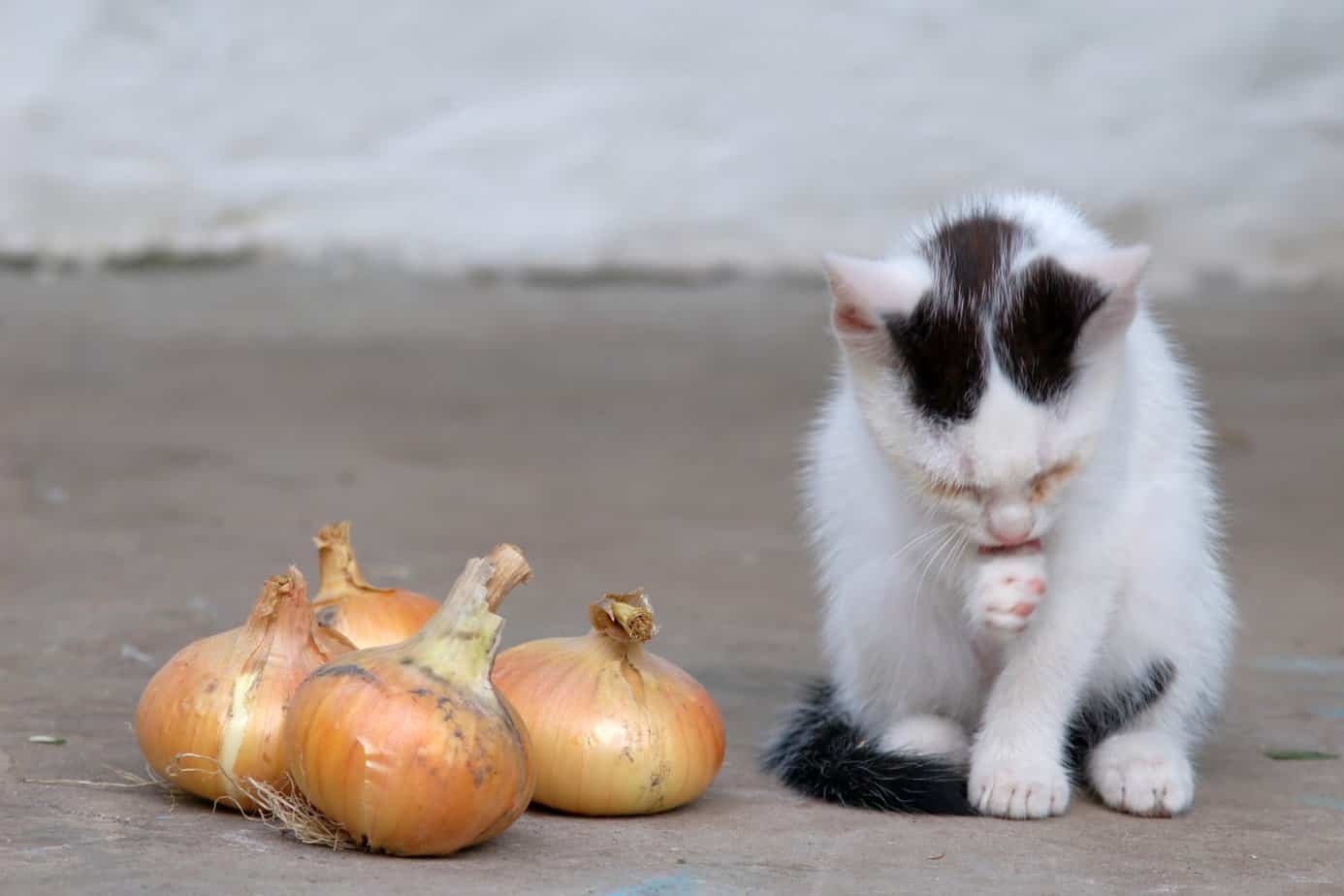As a homestead owner or gardener who grows vegetables, there are some questions you may have. One common question that you may come across is whether an animal can eat onions? Sometimes this is to deter unwanted foragers to your lands or other times you might even be thinking of feeding an animal onions 🙂 Well, animals like squirrels, rabbits, raccoons, moles, birds, deers, snails, slugs, groundhogs, and rats can eat onions but others might fall ill.
So, to know about the animals who can eat onion and who do not read through this article.
What Animal Eats Onions?
Various animals love to eat onions. The most common include squirrels, rabbits, dogs, cats, raccoons, moles, birds, deers, snails, slugs, groundhogs, and rats. But not all animals find onions as a part of a delicious dinner. Some animals damage the onion plants and leave them half bitten, while others enjoy them.
Are Onions Safe For All Animals?
No, onions are not safe for all animals. When it comes to pets like dogs, cats, horses, sheep, goats, house rabbits, or cattle, all parts of onions in any form are dangerous. The onions contain propyl disulfide, a toxic chemical that reduces RBC generation, causing anemia. Avoiding onions for such animals is highly important.
What Animals Will Eat An Onion?
Various animals will enjoy the onion. The most common ones are listed below:
- Rabbit – Though onions are toxic for rabbit health in the wild, they will eat onions if they fail to find any other food.
- Chicken – Though it was confusing yet, chickens do love onions. Also, onions boost their health.
- Squirrels – Squirrels are vicious eaters and love onions. Being intelligent animals, they learn by themselves if the food is good for them or not.
- Raccoons – Raccoons are omnivores who will eat anything they get hands-on. So, they do eat onions as well.
- Groundhogs – Groundhogs love onion a lot. They are usually spotted in the garden and love to eat leaves the most.
- Moles – Moles do eat onions and enjoy the surrounding soil as a part of the feast.
- Deer – Deers eat onion, but this is not a part of their typical diet. They seldom enjoy onions.
- Rats – Rats love to binge on onions. The thiosulphate chemical in onions attracts the rats, which they find hard to resist.
Are Animals Attracted To Onions?
Yes, the pungent smell of the onions does attract the animals. But that is not true for all animals. Common pets like dogs and cats do not prefer to eat onions, while the smell of onions attracts other small animals.
What Pest Eats Onions?
Various pests love to eat onions. The common pests that are known to eat onions are as follows:
- Slugs and snails – Slugs and snails love to chew on onions. It is indeed a dinner for them, but they damage more than they eat.
- Thrips – Onions fail to repeal thrips which is an insect. Thrip infected onion plants will turn yellow and not be suitable for others.
- Onion Maggots – These live in the soil and eat away at the bulb by building a hole in it.
- Cutworms – These are nocturnal caterpillars and are known to enjoy onion at night. They can damage the whole plant as they are usually seen in groups.
- Grasshoppers – Being great at camouflaging, it is hard to spot grasshoppers eating onions. But these are the ones who favor the onions most.
- Onion flies – The onion flies are known to eat the leaves of plants. Also, they lay eggs on onion plants which causes harm and damage.
- Leafminers – These insects use the onion leaf to hide, but they also enjoy the onion meal. Also, leafminers lay eggs in the leaf tissue, thus damaging the whole plant.
- Bulb mites – These are tiny mites that infest the onion bulbs. They eat the bulbs in storage and on the plant, but the damage is a more significant issue.
- Wheat curl mites – These mites are tiny and might be difficult to spot with naked eyes until looked for carefully. They eat onions when placed in storage after harvesting.
- Nematodes – These roundworms are herbivores in nature. They dig into the soil, feed on the roots, bulbs, and stems, and infest the soil.
What Parts Of Onion Are Good To Feed To Animals?
There is no restriction for the animals who love to eat onion as to which part they can eat. The onion bulb and leaf are safe for such animals, and they can have them in their regular diet. But for those who do not find onion a delectable meal, you should avoid it completely.
What Is The Right Way To Feed Onions To Animals?
Onion is preferred by wildlife and pests mostly. So, there is no right way to feed them. Rather, these animals prefer to eat by themselves, which calls for securing your vegetable garden to avoid damage. If you have snails or slugs with you, just place leaf or onion covers, and they will munch on them themselves.
What Forms Of Onions Are Toxic To Pets?
All forms of onions are toxic to pets. Pets are poisoned by all parts of the onion plant, including the flesh, leaves, juice, and processed powders. Onions and the rest of the allium family are toxic to pets, whether raw or cooked, dried or powdered.
What Are The Symptoms Of Onion Toxicity In Animals?
Symptoms can emerge immediately after intake, but they usually take a few days. These are usually common in pets. The following symptoms characterize onion poisoning:
- Lethargy
- Stomach issue
- Abdominal pain
- Decreased stamina
- Fainting
- Loss of appetite
- Yellow Gums
- Heart or respiratory rates too high
- Vomiting
- Diarrhea
- Coordination problems (ataxia)
- Urine with a tan color
- Anemia
What Are The Benefits Of Feeding Onions To Animals?
The main benefits of feeding onions to animals include:
- High nutrient content – Onions have low calories and high vitamins and minerals. They offer fibers too needed to help with the body’s metabolism.
- Heart health – Onions have antioxidants and compounds that fight to reduce blood pressure and reduce the risk of a heart attack.
- Antioxidants – Onions are loaded with antioxidants needed to fight serious diseases like cancer.
- Boost bone health – Onions can support bone health. It helps to build better bones and helps with immunity.
- Antibacterial – Onions are naturally antibacterial and help manage a better digestive system and avoid complications.
- Better digestion – Most wildlife prefers onions as they help to improve their digestive system. Rich in fibers and prebiotics, this helps to improve gut health a great deal.
Frequently Asked Questions (FAQs)
Do Squirrels Like Onions?
Yes, squirrels do like onions a lot. They also love other things like apples, nuts, peaches, peas, carrots, raisins, and various other fruits and vegetables. Being vicious eaters, they can destroy onion plants sometimes.
Do Birds Like Onions?
Most birds do not like to eat onions. However, they might consume a part of it when offered. Birds usually eat seeds, berries, insects, and other similar kinds of food.
Do Cats And Dogs Eat Onions?
Dogs and cats are not fond of onions. They do not prefer to eat onions at all. Onions are toxic for them and should be avoided at all costs as they can cause negative health impacts.
Do Cattle Eat Onions?
Onion is toxic for all cattle. One should take due care to avoid feeding cattle onions as it can also cause negative health impacts.
Do Horse, Goat, Or Sheep Eat Onions?
No, horses, goats, or sheep do not eat onion. It is toxic for their health and can lead to adverse health impacts.
Can you feed boiled or fried onions to animals?
The animals that feed on onions are usually wild or pests. They prefer to have raw onion as compared to boiled or fried ones. So, you are not required to prepare onions for them.
Conclusion
Onion is quite a common vegetable grown in the garden or field. Animals like cattle, horses, sheep, dogs, cats, or goats should not be fed onions. Wildlife and pests do enjoy having onion in their diet. Keep an eye on the pet if they onion, and in case of any sign of toxicity, contact the veterinarian immediately.


